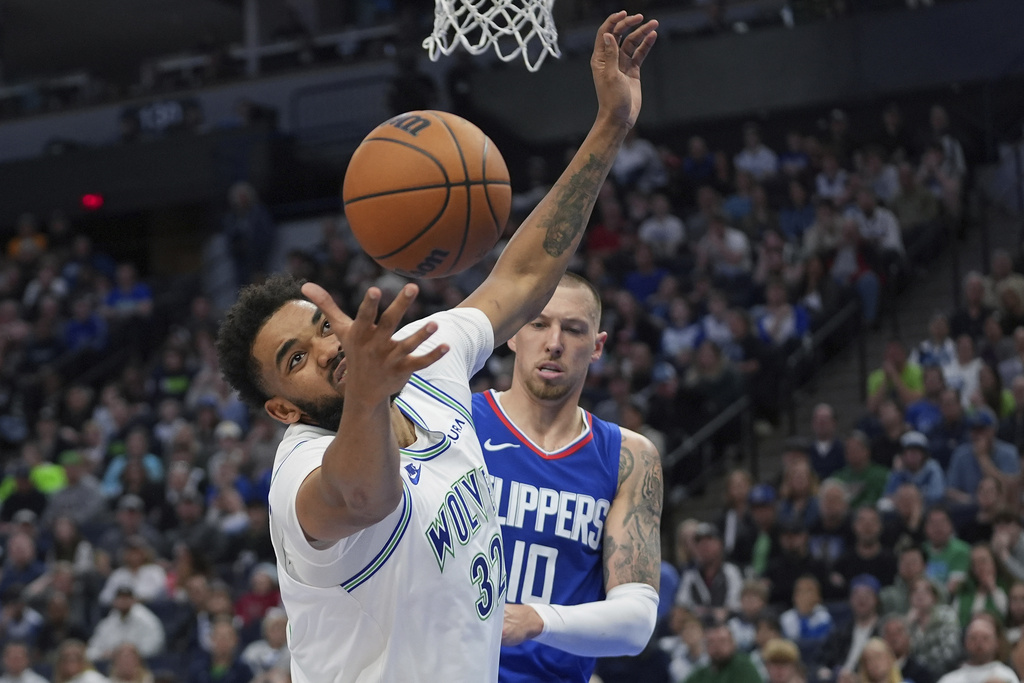
Timberwolves fall to Clippers as late-game struggles strike again
The Timberwolves may have to secure all of their playoff victories within the first 40 minutes of such contests. That’s because the late-game struggles that continue to trip them up have proven to be far more than happenstance.
That’s what cost the Wolves again Sunday in their 89-88 home defeat to the Clippers. In its current seven-game homestand, which wraps Monday against Portland, Minnesota has dropped all three games against playoff-quality opponents: Milwaukee, Sacramento and now Los Angeles.
The last two, specifically, were there for the taking. Minnesota simply continues to not have the answer for those situations. The Wolves went 4 for 11 from the field in clutch time Sunday.
When they needed a basket late, they couldn’t find one. Minnesota had consecutive possessions in the final minute in which it needed a bucket to take the lead. Anthony Edwards missed a 3-point attempt, and Karl-Anthony Towns missed a runner on the baseline.
The latter miss left Minnesota in a situation where it had to foul. Kawhi Leonard made a pair of free throws at the other end, leaving the Wolves — who led by as many as 16 in the first quarter — trailing 99-96 with 13 seconds to play.
Timberwolves coach Chris Finch told his players a quick two-point basket was an option, given the Wolves still had a timeout.
“I thought we had the quick two, the catch-and-go quick two. We had the pull-behind, and then we had some outlets for three. We had another timeout, so the quick two would’ve set us up there. Foul again, and then advance the ball. That was ideal,” Finch said. “But that didn’t happen.”
What instead happened was Towns and Edwards passing the ball back and forth on the perimeter against defenders who refused to give up a 3-point attempt. Finally, Edwards made a move to the bucket. He looked back for Towns, but the sharpshooting big man’s defender wasn’t going to leave his side.
So Edwards took the free dunk. The problem was, there were only three seconds to play at that point. The Clippers (39-20) inbounded the ball and Minnesota (42-19) couldn’t get a foul before the clock expired.
Ballgame.
“Yeah, it was too late. I didn’t know it was three seconds left when I took the two,” Edwards said. “I would’ve just tried the step-back and take the three (had I known).”
Add it to the list of Minnesota’s late-game mental errors alongside shoddy shot selection and baffling fouls. You can either laugh or cry at this point. Kyle Anderson chose the former.
“We’re getting it all out of the way right now. Playoffs is gonna be great, and down the stretch (of the season),” Anderson said. “We’re still a young team. People forget we got a lot of young guys out there. Of course, we got to grow up and figure it out. I think we will, just learn from our mistakes.”
But those mistakes are happening again, and again, and again. They’ve plagued Minnesota for three seasons now, torpedoing countless regular-season contests and, eventually, playoff series.
There’s little to suggest Minnesota isn’t heading down a similar road this season. Minnesota was again elite defensively. Leonard finished with 32 points, but the Clippers shot just 38 percent from the floor and 29 percent from deep.
Yet somehow the Wolves were worse. They shot 39 percent from the floor and just 27 percent from beyond the arc. Still, even just one more late bucket could’ve absolved the offense of all wrongdoing. It didn’t come. For this team, it rarely does.
Since Dec. 20, the Wolves own the NBA’s worst clutch-time offense, scoring just 94.6 points per 100 possessions. They’re getting outscored by 23.8 points per 100 clutch possessions in that span. Clutch time is when the game is within five points in the final five minutes of regulation or overtime — also known as winning time.
Currently, for the Wolves, it’s losing time.
Losses over the last month and a half to the Clippers, Kings, Bulls, Magic, Spurs and Hornets raise red flags. Minnesota’s last real late-game victory came in Oklahoma City on Jan. 29. The team’s general success has largely covered up such concerns to this point.
But it’s reached the point where the clutch-time conundrum has officially put the team’s chances for the No. 1 seed in the West in jeopardy. And there’s little evidence of change coming around the corner.


